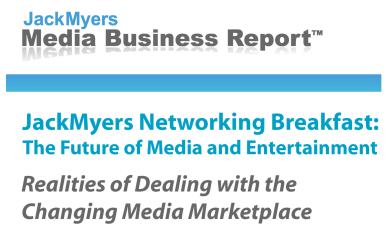blip.tv, Colgate Palmolive, Aegis, and Worldwide Biggies Execs Focus on Convergence at JackMyers Event - MediaBizBuzz.com

"The Convergence Is Here"
That declaration kicked off, and set the tone for, yesterday's JackMyers Networking Breakfast. Framed as "The Future of Media and Entertainment: Realities of Dealing with the Changing Media Marketplace," the event was noteworthy, in the face of an economic slowdown, for its across-the-board bullish outlook on Media. The range of the panelists' divergent perspectives, coming from the distinct but overlapping worlds of brands, agencies, content creators and hosts, ensured a dynamic conversation.
Invited speakers included:
Sarah Fay, CEO, Carat and Isobar
Dina Kaplan, COO, blip.tv
Jack Haber, VP Global Advertising and eBusiness, Colgate Palmolive Company
Albie Hecht, CEO, Worldwide Biggies
Shane Steele, Consultant and former Coca-Cola head of Interactive Marketing
(Bios here.)
The findings of the new JackMyers Media Business Report white paper, Great Expectations: Research Industry Looks Toward New Era in Media Measurement, [Discussion of findings.] served as a point of entry for moderator Jack Myers to offer that while the media business is in the middle of flux, and that it will be unrecognizable five years hence, that we are confronting an opportunity of change. This theme of a blurring between traditional and new media was carried forth throughout the morning. While we aren't there yet, Dina Kaplan was confident that in a few years the prevailing hierarchy of TV on top, Web shows on the bottom would be gone: "They're just going to be content." And that's just the starting point of the paradigm shift: Not only did Shane Steele express surprise that competitors are sometimes finding it necessary to partner in this ecosystem (call them "Media Frenemies") but Jack Haber was unambiguous in his belief that unless specialized agencies were able to collaborate with his lead agency Young & Rubicam, that "they can't be sitting at the table."
Part of Dina Kaplan's mission at blip.tv, in addition to hosting and distribution content, is monetizing her original programming. When Unilever's Dove expressed interest in participating in Amanda Congdon's videoblog (she of "Rocketboom" fame) Congdon created a Wiki. Her community developed and scripted an ad spot that Congdon shot and starred in, and in that way made the brand authentic and relevant.
Audience members seemed almost cult-like in their admiration for Sarah Fay's work in creating a social network for Adidas. Not only was there a coordinated effort to drive print, OOH, and mobile to their online efforts last April, but their reach surpassed their expectations. While 600,000 visited their Web site, and only 75,000 of these downloaded various objects for their MySpace pages, their internal research discovered that visitors to their Websites in turn hit (drumroll, please) 21.1M. A dynamic logic study found a 75% increase to brand equity. Fay remarked that this was possible because the client allowed Carat to be Media Architect of the campaign and that, in fact, "It was a watershed for Adidas."
Notably, it was the content creators on the panel that argued for more discipline around metrics, even more so than their counterparts. Albie Hecht half-jokingly called for "No more voodoo; Get the metrics out there" in response to Dina Kaplan's point that she was looking forward to the IAB standards due out next Monday.
While Sarah Fay observed that "we're seeing investment by all major players in online" the discussion focused on how that investment is being deployed. Albie Hecht voiced the caveat that we need to be "careful to distinguish repurposing of content versus creating something authentic to the Web that isn't pushed, but is true engagement. Not: Spongebob is now a podcast; we're digital!"
To those brands and agencies still too cautious to pull the trigger Dina Kaplan offered a compelling brief: "It's like a lottery. [TV] can't count on the viewers like they used to. But pretty much after six months out, for our shows that get two to four million views, we can make guarantees."
Jack Haber had a refreshing perspective in that his focus was on his consumer. While branded content has its place – and Shane Steele's work with Coke is axiomatic – he asserted that "we're not in the content business." Despite Albie Hecht's whimsical (and germane) ad lib that he'd find a way to embed Colgate Palmolive's message in a gaming code, Haber had a few takeaways that didn't mark him "old-fashioned" but rather as steward of integrity on behalf of Colgate. When the discussion of social networking came up, he voiced a desire to do so carefully and "respect the consumer," alluding perhaps to Project Beacon's missteps on Facebook. While Dorian Benkoil raised a question about the "danger" of losing control of one's brand, Haber offered this wisdom: "The consumer is not in control of your brand. Equity and positioning are up to the Marketing Manager." Sarah Faye echoed his thoughts: Recalling clients who had voiced negative comments within a blog or Website, she spoke of "brand champions" who rose up, unbidden, and responded authentically to the criticisms, adding: "Consumers tell each other the best stories."
And were the agencies of record rising to the challenge? While he admitted that the large agencies were slow to do so, Jack Haber qualified the remark by adding that they were working. Colgate Palmolive sees a range of agencies – large and specialized – because "no one can do it all right." Haber added a historical perspective, that over time agencies became decentralized, then became separate businesses, and therefore now must be re-integrated, the better to be connected with the consumer. Dina Kaplan had particular shout outs to Digitas and Deep Focus, but agreed that an infrastructure was still needed to support interactive agencies. Assenting, Shane Steele found that "agencies are doing a great job, specializing in driving efficiency." Sarah Fay observed that while it's been satisfactory for agencies to be on the same page – in synch with timetables and targets -- that we are tracking to the point that we need to know clearly, "Who Owns It?"
Since the emphasis of the event was the Future of Media and Entertainment, it was unsurprising to find the panelists sparking as they were asked to look ahead. Shane Steele pointed out that we must figure out social media monetization. Albie Hecht predicted that the iPhone will open the game platform to mobile, effusing that "it'll blow up." Jack Haber struck a sincere and uplifting coda: "We're still at the beginning. Let's invent together."
Related:
Nina Spezzaferro's in-depth discussion with blip.tv's Dina Kaplan and Worldwide Biggies CEO Albie Hecht.
Elaine Liner's spotlight on Web shows Food Court Music and Best Game Ever.
Later today check out the photos from the event.
Tomorrow: Read Ed Martin's TV Buzz


